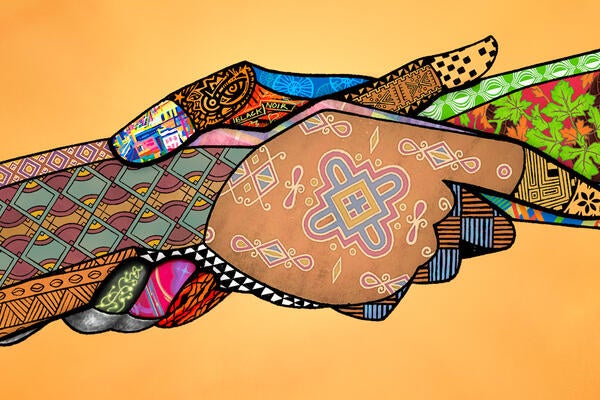
Addressing reports of hate on our campuses
A message from President Goel

A message from President Goel
By Vivek Goel President and Vice ChancellorLast week, I had the opportunity to sit down with groups of Palestinian and Jewish students to hear from them how the ongoing conflict is affecting them here at Waterloo.
I appreciated the opportunity to listen and learn directly from them. I was also saddened and deeply concerned by some of the things I heard, namely, that these students and their colleagues continue to face antisemitism, anti-Palestinian racism and Islamophobia on our campuses.
While the rise in reported instances of racism locally mirrors what we’re seeing in society right now, it’s unacceptable that people in our community who are already affected by the violence overseas must also contend with hate and fear when they come to study and work here. Everyone in our community has a right to safety.
I’d like to thank the members of Voices for Palestine, the Muslim Students Association, Hillel Waterloo and the Rohr Chabad Centre for Jewish Life who took the time to share their experiences and concerns with me. I commend these students for speaking out with sincerity, civility, and eloquence during what is a very difficult and emotionally charged time.
There were many common themes from my meetings with each group. Each appealed for more education and awareness across the University, including about the kinds of rhetoric and images that are particularly hateful or hurtful to their communities. Both groups called for more understanding and empathy.
Some students told me that they found the process for reporting instances of hate was not clear or easily accessible. We will make the reporting process easier and speed up our response time when we hear complaints. From today, you can email gethelp@uwaterloo.ca if you experience instances of hate. You can also continue to report them to your supervisor, or to the Office of Equity, Diversity, Inclusion and Anti-racism. If your safety is immediately threatened, call the police at 911 or special constable service at 519-888-4911.
I acknowledge that procedural considerations are not the only obstacle to reporting. Some students and employees have shared that they feel reluctant to raise formal complaints out of fear of academic or social repercussions or retaliation. This is also unacceptable. We all have a role to play in supporting our students and colleagues if they are experiencing harm.
The gravity of the current conflict weighs heavily on us all, but we must remember that members of our community are affected in many ways. All members of our community are free to express their own views on matters, but we must aim to maintain a supportive, respectful and tolerant environment.
I acknowledge that some of our communities on campus feel that the line between free speech and hate speech has been crossed in recent weeks. The conversation about what is acceptable at Waterloo is an important one which deserves careful attention and thought. To that end, we recently made a call for members for a task force that will focus on these kinds of questions. The task force intends to develop distinct principles that provide our community with clear guidance on Freedom of Expression which will accompany our current policies.
Our speaker series exploring antagonism and intimidation in academia also continues, with several events planned leading up to June, when we’ll host an international conference.
These are difficult times. We must remember who we are and what we are here to do. We are a community of curious, collaborative, innovative and entrepreneurial problem-solvers who seek to understand and identify equitable and sustainable solutions for the future of humanity and our planet. Let’s keep this vision in mind as we work through differences and challenges in the days and weeks to come.

Read more
A message from the President and Vice-Chancellor

Read more
As we prepare to celebrate Fall 2025 convocation this week, I would like to extend my heartfelt congratulations to our class of 2025.

Read more
President Goel has informed the board he will not seek a second term as president to focus on his family
The University of Waterloo acknowledges that much of our work takes place on the traditional territory of the Neutral, Anishinaabeg, and Haudenosaunee peoples. Our main campus is situated on the Haldimand Tract, the land granted to the Six Nations that includes six miles on each side of the Grand River. Our active work toward reconciliation takes place across our campuses through research, learning, teaching, and community building, and is co-ordinated within the Office of Indigenous Relations.